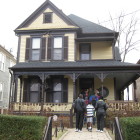
Living the Dream
|
I was sitting at a table with a fellow prisoner more than 20 years ago. We were taking a break from our work in the staff kitchen, smoking cigarettes and talking about some forgotten subject. The room we were in was one of the few places where I could relax, since it was a restricted area and usually quiet. One of his friends walked into the room, paused, and stared at us for a few seconds. He made a comment about talking to a white guy, a “cracker.” My coworker, who was black, just laughed and said, “We’re living the dream of Dr. King.”
I had of course heard of Dr. King, but in that world his influence and ideas seemed pretty far away most of the time.
